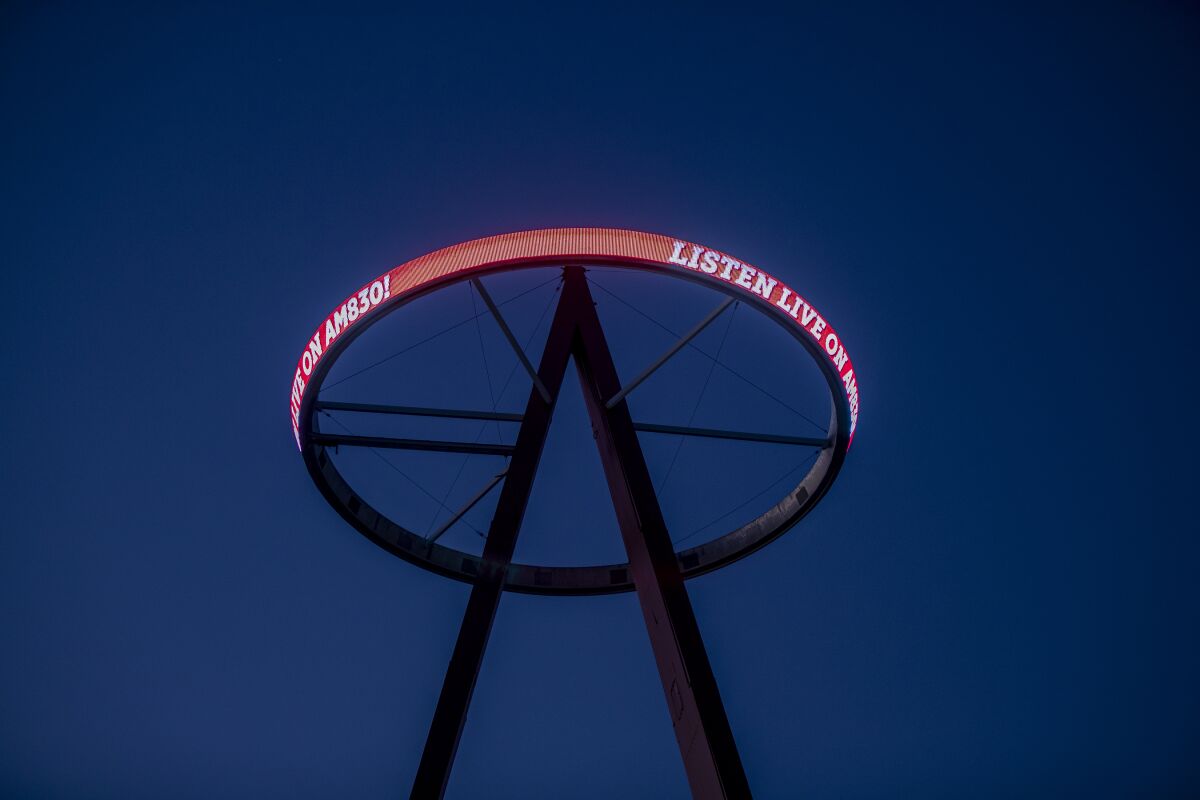You gotta be kidding me. #ArteOUT “What the halo happened to Angels’ tradition of lighting up the iconic ‘Big A’?”

Half a century ago, the greatest of all the Angels broadcasters punctuated his call of every victory with four of the most famous words in franchise history: “The halo shines tonight!”
Dick Enberg’s exclamation point was not a hokey catch phrase. It was a fact.
The “Big A” is not just a nickname for Angel Stadium. There is an actual big A in the parking lot. It is 230 feet tall, topped by a halo that lights up, visible to fans as well as to motorists on three nearby freeways.
When the Angels win, the halo lights up. When the Angels lose, the halo is dark.
Until now, that is. Now, when the Angels lose, the halo still lights up.
“I noticed that,” Mike Trout said. “When did they start doing that, last year?”
Traditions are sacred matters in baseball, uniting fans across generations, from the singing of “Sweet Caroline” in Boston, to the racing sausages in Milwaukee, and to the yelling of “O!” during the national anthem in Baltimore. (O, as in ‘O say does that star-spangled banner yet wave,’ at the home of the O’s.)
The Angels have featured a monkey jumping up and down on their video boards since 2000. For two decades, they have played “Calling All Angels” before each home game.
The Angels’ radio broadcasts feature an instrumental version of the team fight song, which dates back to 1966, the year the team moved from Los Angeles to — yes, the Big A. (You can listen to the song here.)

The Big A sign at Angel Stadium. These days that baby is lit up even when the team loses.
(Allen J. Schaben / Los Angeles Times)
Yet the most enduring of all the Angels’ traditions might well be the lighting of the halo. Jarrod Washburn, the Game 1 starting pitcher in the Angels’ only World Series, talked about the joy in leaving the stadium after a hard-earned victory and looking up to see the halo shining brightly.
In 2002, when the Angels won that World Series, the first words of my story in The Times were a nod to that tradition, and an homage to Enberg: “The halo shines tonight, and forever.”
Victor Rojas, who called Angels games on television from 2010-20, put his own spin on the tradition, serenading each victory with these words: “Light that baby up!”
Rojas even trademarked his phrase, which would have given him the sole right to sell caps and shirts and coffee mugs that said “Light that baby up!” However, he decided not to pursue the merchandising route.
Today, the Angels’ Twitter account celebrates each victory with Rojas’ words, and below them a picture of the halo shining brightly.
Rojas said he had not heard that the Angels now light up the halo even in defeat. He said tradition demanded otherwise.
“That’s how I would want it done: If the halo is not shining, then, clearly, the team did not win,” he told me.
The Sacramento Kings, inspired by the Big A and its halo, put their own twist on the idea of a victory light shining into the community. The Kings celebrate each win by shining a purple beam into the sky, with crowds counting down to victory by chanting, “Light the beam!”
The Angels declined to comment for this column, other than to confirm the change predates this season.
Technology changes over the decades, and a halo that once was limited to an on and off switch now can be lit in different colors, at varying levels of brightness. The halo now can display messages too.
Arte Moreno, the Angels’ owner, made his fortune in outdoor advertising. He smartly uses the latest and greatest halo for promotional messages, including ticket sales and upcoming events, on the unique outdoor advertising spot in Orange County, with an average of more than 200,000 cars passing on the adjacent 57 Freeway every day.
When the Angels win, the halo shines brightly, and now the words “Angels win!” spin around the halo as well.
When the Angels lose, the halo still shines — albeit more dimly, and with no message.
It is still plenty visible, though, defeating the point of the tradition: One look at the halo, even from a distance, and you could tell whether the Angels had won. If the halo was dark, the Angels had lost.
Might be a big deal to you. Might not. But, in this most must-win of all must-win seasons, for a franchise afflicted by alleged curses for much of its existence, why tempt fate? Light that baby up, or keep it entirely dark.
